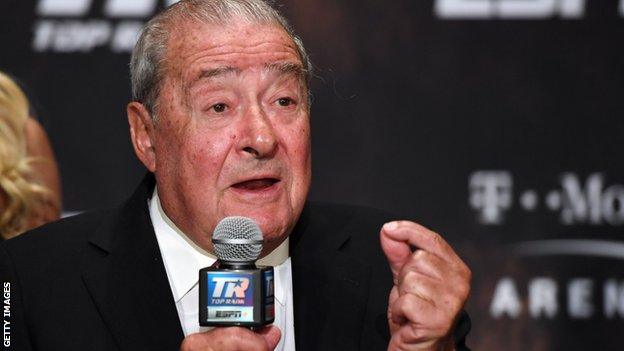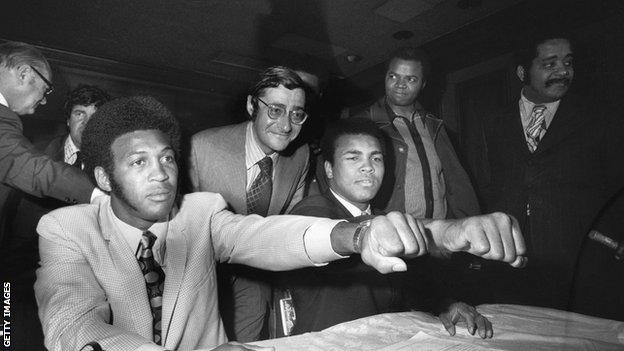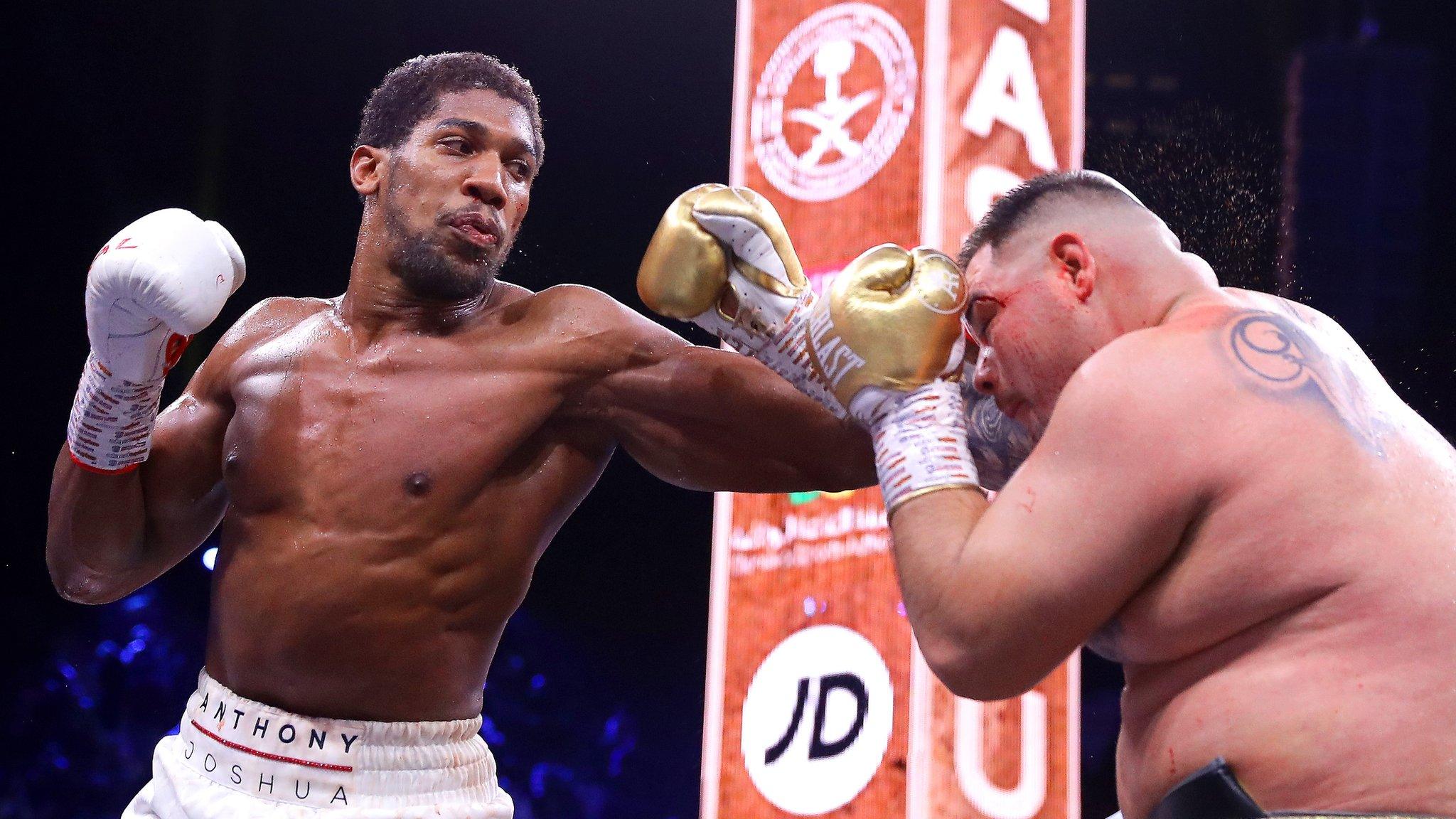Bob Arum: The four key points for boxing promotion
- Published

Bob Arum worked as an attorney in the US Department of Justice during the Kennedy administration and says he had little interest in boxing until 1965
In Bob Arum's office hangs a picture of him embracing Muhammad Ali.
Both men have written on the photograph, with Arum's message reading: "To Muhammad, the one who made it possible, with love."
Arum, 87, and still at the forefront of boxing promotion, has pushed the careers of fighters from Ali to Manny Pacquiao, to Tyson Fury.
He holds no regret over letting future five-weight world champion Floyd Mayweather slip out of his grasp, has learned to make peace with rivals and credits marijuana as being key to his longevity.
Arum is in Las Vegas promoting Saturday's heavyweight bout between Fury and Otto Wallin. As we speak, his mobile phone constantly pings with text messages.
He has now promoted around 2,100 fight nights since 1966 when he thought he would do just one event.
Work in the legal profession gave him a first glimpse of the sport, when, working for the US Attorney's Office, he was instructed to seize funds raised from Sonny Liston's fight with Floyd Patterson in 1962.
"Because of that I learned the numbers but I knew nothing about boxing," he says. "I had never seen a fight.
"Then in 1965 I met Jim Brown, possibly the greatest American footballer of all time, and he introduced me to Ali. Before I knew it I was promoting Ali.
"That was the big step. Then I thought I'd do one fight for the kicks and get out. But a UK promoter asked me to bring Ali over to fight Henry Cooper at Arsenal's old stadium and, 53 years later, I am still at it."
After nearly 60 years in a chaotic business, Arum offered BBC Sport a four-point blueprint for anyone keen to promote.
Be prepared to learn

Bob Arum stands between Jimmy Ellis and Muhammad Ali before their heavyweight fight in 1971
With a Harvard education, Arum had business acumen; the art of promoting, though, was not natural to him.
However, 27 bouts by Ali's side had lasting impact in a career that saw him go on to work with some of boxing's greatest names. None were bigger than Ali, the first man to hold the heavyweight title on three separate occasions.
"Truly, everything I have learned about promotion and how to get attention, it started with Ali," says Arum. "He was the greatest promoter I have ever, ever been around. He was a great influence on my life.
"I remember people would come up to me and say how great I was for thinking up all these ideas. It was embarrassing as they weren't mine, they were his."
From changes in broadcast platforms to social media's influence, Arum has learned to adapt to industry advances but feels one specific issue is the greatest threat to any budding promoter.
"The most difficult part of this business and why it sometimes gets insane, is the fact that there is no barrier to entry," he adds.
"People come in with money, knowing nothing and that can be hugely problematic if people mess up the market place."
You'll make mistakes, deal with it
Arum, who lives in Las Vegas and part of the year in Beverly Hills, has made hundreds of millions of dollars through his Top Rank organisation.
He could have made more.
Mayweather bought himself out of his contract for $750,000 in 2006. His subsequent wealth has seen the decision labelled "boxing's greatest investment".
"The mistake I made was because of my long relationship with Ali, I thought I knew everything about the African-American community," Arum says.
"When Mayweather kept pushing us to market him with that community, I thought he didn't know much. But he was looking at the young.
"He realised the potential and as an older person I did not. He made a fortune.
"With Andy Ruiz Jr, who we promoted, he wanted tremendous money for fights so we let him buy out his contract. He went on and hit the lottery. He destroyed Anthony Joshua.
"That's life, you can't dwell on that. I am far from angry or resentful."
You will be challenged

Bob Arum and Don King were long-time rivals who eventually worked together
Right now Arum pits his wits against the likes of Eddie Hearn in the UK and Al Haymon in the US. Rivalries exist but he faces none quite like his time spent squaring off against fellow American Don King.
King emerged as an adversary in the mid-1970s - notably when he promoted the 'Rumble in the Jungle' between Ali and George Foreman - and remained a serious threat for more than 20 years.
"He was a tremendous competitor," recalls Arum.
"I had been with Ali, so I was associated with the Nation of Islam and the civil rights movement in the US.
"King made me irate when he tried to label me a racist. It worked for a while with black fighters signing with him. I learned how to handle that.
"He had really no life without boxing. He would stay up until all hours calling around the world to make fights.
"When the time came, we worked together on big fights. One thing I learned early on is it's not about you. If a fighter has an opportunity, you can't let personal animosity get in the way."
The secret to longevity
Arum was 74 when YouTube was created. As we speak, he is about to conduct interviews with some of the platform's channels that serve many of the sport's youngest fans.
"The secret to success and longevity is simple; enjoy what you are doing," he says.
"I know people in this business who are so driven but they are constantly unhappy.
"Another thing is I know how to relax and what I have used instead of alcohol is marijuana, even when it was not legal."
Asked when he started using the substance, he jokes: "As soon as I got into this business.
"It helps rest your mind so that when you have to make tough decisions, your brain is rested."
For now, three months short of his 88th birthday, there can be no rest. Arum is calling the shots at a fight week, again.
Saturday's bout is expected to start at around 05:00 BST on Sunday in the UK and will be broadcast on BBC Radio 5 Live with full live text commentary on the BBC Sport website.
- Published7 December 2019
